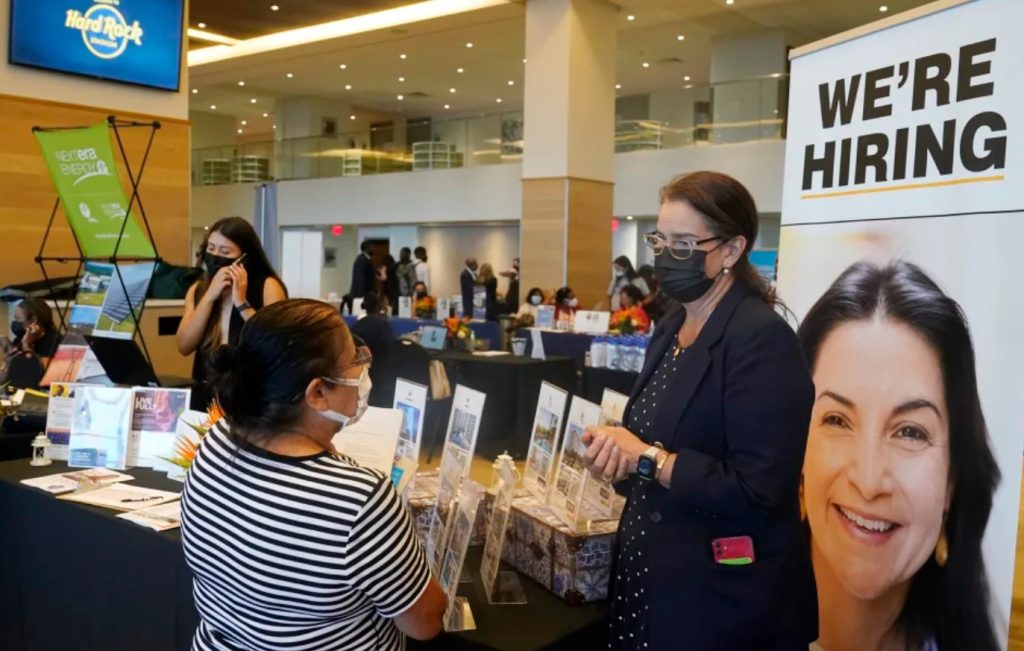
The number of job openings remains near record levels, as does the portion of workers quitting their jobs. The end of enhanced jobless aid hasn’t brought a surge of new workers off the sidelines, as some analysts expected.
The national quit-a-thon has legs, and employers may be wasting their breath blaming bad government policies or other external forces for the difficulty finding workers. Instead, they could look at their own role in fueling the Great Resignation. They’d see a lot of problems in the mirror.
“Many of us leading companies have been very focused on getting through the pandemic, and maybe we haven’t been taking as much time and care around our employees and our talent and their development,” Rob Falzon, vice chair of Prudential Financial, said in a recent webinar co-hosted by Yahoo Finance and the Bipartisan Policy Center. “Their learning curves have flattened, they’re working really hard and they’re thinking, ‘I want to advance my career and to do that I may need to go elsewhere.’ Compensation always motivates people, but I think there are more fundamental things at play here.”
In a recent Prudential survey, 46% of workers said they’re looking for a new job, or considering looking. Better pay was the main driver, cited by 45% of those looking to switch. But the second-leading reason was lack of growth opportunities, cited by 26%. That strongly suggests companies that need workers already have people on the payroll who feel underutilized or mistreated and might be able to fill some of the staffing need, if only the bosses would get the message. Somebody’s messing up.
The Covid pandemic has obviously upended work routines at many companies, and managers haven’t yet grasped the changing ways workers think about their jobs. Earlier this year, Microsoft published research showing that business leaders are largely satisfied with the hybrid remote/on-site work routines at their companies, but ordinary workers are not. Employees like the flexibility that comes from remote work, for instance, but in the Microsoft survey of 84 global businesses, 54% of workers said they feel overworked and 39% said they feel exhausted. About 20% said their employer doesn’t care about their work-life balance. Remote workers also tend to feel disconnected from their companies and their colleagues.
By some measures, employers have reacted slowly to the difficulty finding workers. There’s been talk of a labor shortage for a year or more, but there was no notable pickup in average pay until recently. Average hourly earnings are now up 4.8% year-over-year. That’s a solid gain, but inflation is 6.8%, so wage gains still trail price increases. That will only amount to qualify-of-life improvements if inflation comes down but pay hikes stick.
The Atlanta Federal Reserve tracks wage gains for people who switch jobs, and that trend is similar. Job switchers didn’t begin to lock in above-average wage gains until August. The typical job hopper now nets a 5.2% boost in pay, the highest level since 2002. That likely does reflect the impact of workers taking advantage of abundant jobs to get a raise by leaving one job for another.
Of all the things companies can to do lure or keep workers, raising pay is probably the easiest. Improving culture, offering better internal opportunities and promoting career development rely more on good bosses working closely with employees. There’s often no across-the-board solution that brings company-wide improvements. Some bosses just don’t care. Companies run employee-satisfaction surveys all the time, yet workers rarely notice any difference.
If employers are finally raising wages to draw or keep workers, other improvements might follow. During the workplace webinar, Maurice Jones, executive director of the OneTen Coalition, argued that the single best thing companies can do to find more workers is rethink rigid eligibility requirements, such as the need for a four-year college degree. “A big piece of what’s keeping [workers] on the sidelines are systemic barriers that make no sense,” Jones said. “We’re trying to move to a skills-first approach to hiring, to upskilling and mobility and advancement.” His organization is working with 60 companies to scrap academic requirements in favor of looking for specific skills the companies need, which workers might be able to get through community colleges or apprenticeships instead of a much costlier university degree.
There’s no single thing causing the labor shortage, and no single-bullet solution. With affordable child care in short supply, some parents who want to work have to stay home to care for kids instead. Some people are still worried about getting Covid on the job and are waiting till it feels safer to go back to a crowded workspace. Early retirements have thinned the ranks of older workers. The pandemic has also triggered retrospection and given some people newfound courage to find more rewarding work. Better bosses could probably help with all of those things.